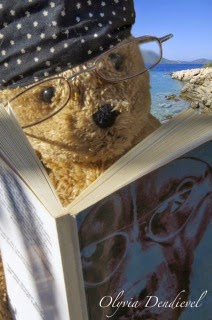My regular readers (you can
probably delete that ‘s’ ) may remember
a post of a week or so ago in which I moaned about the failure of anyone to
turn up to our ‘Fairy-Tale Afternoon.’ Nothing daunted, Kyriaki got the shop
ready again yesterday afternoon, and to our delight (and I hope and believe
theirs too) three children turned up: a boisterous 8-year-old girl, a rather
quieter younger girl, and a rather subdued very small boy. The mothers too
came. The children were provided with cake and at once ran off, heading, in spite
of the dark and wet, for the deserted playground. Kyriaki meanwhile was busy
preparing ouzo and mezés for the mothers, but something had to be done at once
to recapture our escaping audience. I was therefore rather dropped in it when
Kyriaki screamed after the departing children ‘We’re starting!’ and went back
to preparing mezés. ‘You tell the first story, Simon.’
Hmm… three Greek children who had
probably heard of but never yet seen this strange Englishman, and I had to
entertain them … luckily my friend Jane had sent me a good text of ‘Jack the
Giant Killer’ (not the same as ‘Jack and the Beanstalk) and I had read the
first part. So I told them, in Greek, about the killing of the first giant,
domesticating the story a bit with Greek references. (e.g. goats rather than
sheep). Of course, they particularly liked the bit where the giant sticks his
head out of the pit and Jack lops it off with his axe, so I embellished this by
saying he brought the head back to show to the mayor as proof he should get the
reward.
I finished by telling them that if
they wanted to hear what happened to the next
giant (I still haven’t read that bit myself) they must come back next week,
with friends. Then I went outside to join the other grown-ups for a crafty fag,
and so missed Kyriaki’s telling the children a story from the Thousand and One
Nights.
I think they had a good time; I
know I did. I think they will be back next week.
FAIRY-TALE AFTERNOONS
‘Once Upon a Time’
Fairy Tales for
children from three years old to ninety years old.
Told in simple Greek
by Kyriaki Theodorou and Simon Darragh.
Every Saturday
afternoon from 5.30 until the cows come home,
at ‘THE BOOK SHELTER’
(ΤΟ ΣΤΕΓΙ ΤΟΥ ΒΙΒΛΙΟΥ)
In Plateia Christou
(the main village square).
All ages and
nationalities welcome.
There will be cake
for the children, and the bar will be open for the grown-ups.

























.jpg)
.jpg)
.jpg)








